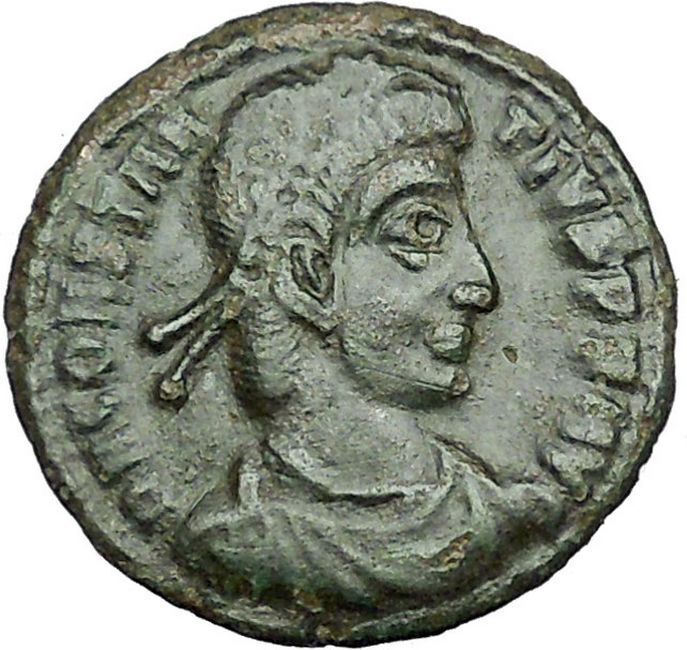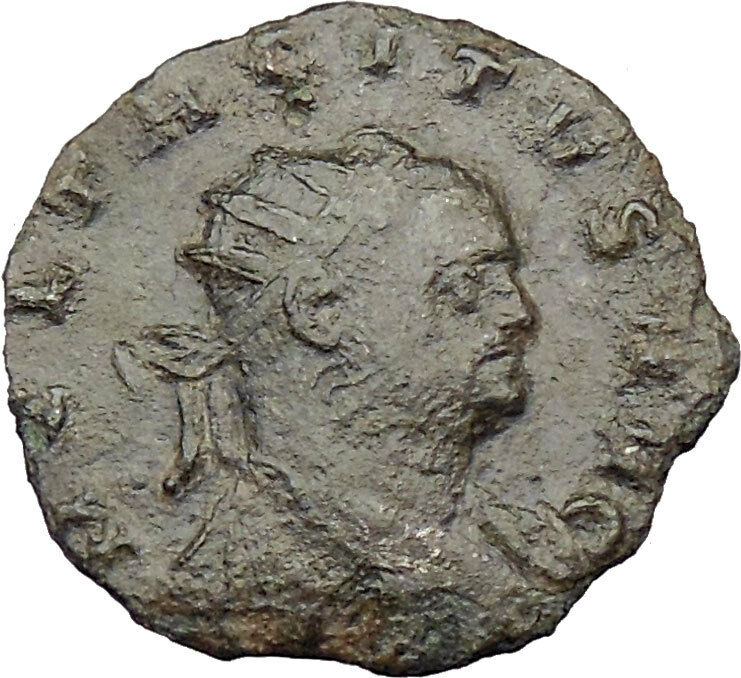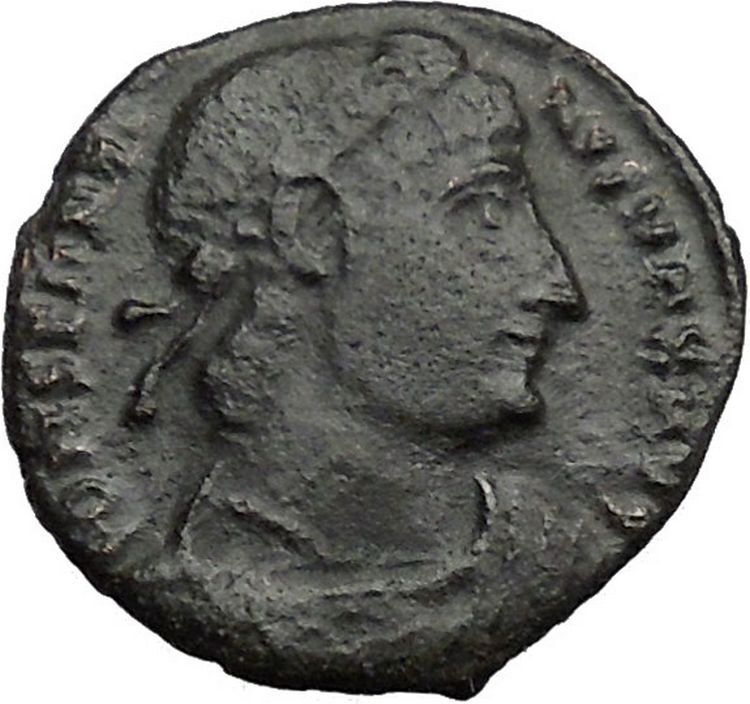|
Claudius II – Roman Emperor: 268-270 A.D.
Bronze Antoninianus 20mm (2.79 grams) Rome mint: 268-270 A.D.
Reference: RIC 48a, Normanby 661, Cunetio 1984, C 114
IMPCCLAVDIVSAVG – Radiate, draped bust right.
GENIVSEXERCI – Genius standing left, holding patera and cornucopia.
You are bidding on the exact item pictured,
provided with a Certificate of Authenticity and Lifetime Guarantee of
Authenticity.
The name Genius comes probably from Lat. gignere, because this deity was assigned
to each human when he was conceived or he was taken under his protection (Varro),
or he has created us himself or has been created together with us (Apuleius).
It’s clear, that the Romans tried to integrate the Genius into their mythology.
His parents should have been Jupiter and Gaea, who has born him, after Jupiter
has created him when he was asleep. Others suggest that he was a son of the gods
and the father of men. In any case all suggest that the Genii – there are many
of them! – take a middle position between the gods and men. As soon as a human
being was born one or two Genii were assigned to him, a white good one and a
black bad one. The good one gives him all of his good thoughts, the bad one the
contrary. Which ever is the stronger one he is the one who forms the character
of the man. Genii always appear at males. Within women there were the Junones.
The Genii stayed with their person until his death when they gave him to the
gods. According to others each man has only one Genius. The Genius handed down
his man to the court and blamed him if he was lying or praised him when he kept
the truth. According to the Genius the judgement was given to him because the
Genius knew all of his secret thoughts. Even families, cities and countries had
these guardian spirits. The Genius of Rome had a golden statue in the VIII regio.
Marcus Aurelius Claudius (May
10, 213
– January, 270), often referred to as Claudius Gothicus or Claudius II,
was a Roman Emperor
. He ruled the
Roman
Empire
for less than two years (268 – 270), but during that brief time he
managed to obtain some successes. He was later given divine status.
//
Life
Origin
and rise to power
Claudius’ origin is uncertain. He was either from
Sirmium
(Syrmia;
in Pannonia
Inferior) or from Naissus
Dardania
(in
Moesia Superior
); both areas are located in
Serbia
.
Claudius was the commander of the Roman army that decisively defeated the
Goths
at the
Battle of Naissus
in September 268; in the same month, he attained the
throne, amid charges, never proven, that he murdered his predecessor
Gallienus
.
However, he soon proved to be less than bloodthirsty, as he asked the
Roman
Senate
to spare the lives of Gallienus’ family and supporters. He was less
magnanimous toward Rome’s enemies, however, and it was to this that he owed his
popularity.
Claudius, like
Maximinus Thrax
before him, was of barbarian birth. After an interlude of
failed aristocratic Roman emperors since Maximinus’s death, Claudius was the
first in a series of tough soldier-emperors who would eventually restore the
Empire from the
Crisis of the third century
.
Claudius
as emperor
At the time of his accession, the Roman Empire was in serious danger from
several incursions, both within and outside its borders. The most pressing of
these was an invasion of Illyricum and
Pannonia
by
the Goths
. Not
long after being named emperor (or just prior to Gallienus’ death, depending on
the source), he won his greatest victory, and one of the greatest in the history
of Roman arms.

The Roman Empire in 268 A.D
At the
Battle of Naissus
, Claudius and his legions routed a huge Gothic army.
Together with his cavalry commander, the future Emperor
Aurelian
,
the Romans took thousands of prisoners, destroyed the Gothic cavalry as a force
and stormed their laager (a circular alignment of wagons long favored by the
Goths). The victory earned Claudius his surname of “Gothicus” (conqueror of the
Goths), and that is how he is known to this day. More importantly, the Goths
were soon driven back across the
Danube River
, and a century passed before they again posed a serious threat
to the empire.
While this was going on, the Germanic tribe known as the
Alamanni
had crossed the Alps
and attacked the empire. Claudius responded quickly, routing the Alamanni at the
Battle of Lake Benacus
in the late fall of 268, a few months after the
battle of Naissus. He then turned on the
Gallic Empire
, ruled by a pretender for the past fifteen years and
encompassing
Britain
, Gaul
,
and the
Iberian Peninsula
. He won several victories and soon regained control of
Spain and the Rhone river valley of Gaul. This set the stage for the ultimate
destruction of the Gallic Empire under Aurelian.
However, Claudius did not live long enough to fulfill his goal of reuniting
all the lost territories of the empire. Late in 269 he was preparing to go to
war against the Vandals
, who were raiding in
Pannonia
.
However, he fell victim to the
Plague of Cyprian
(possibly
smallpox
),
and died early in January 270. Before his death, he is thought to have named
Aurelian as his successor, although Claudius’ brother
Quintillus
briefly seized power.
The Senate
immediately deified Claudius as “Divus Claudius Gothicus”.
Links
to
Constantinian dynasty
The
Historia Augusta
reports Claudius and Quintillus having another brother
named Crispus and through him a niece. Said niece Claudia reportedly married
Eutropius and was mother to
Constantius Chlorus
. Historians however suspect this account to be a
genealogical
fabrication intended to link
Constantine I
‘s family to that of a well-respected emperor.
|









